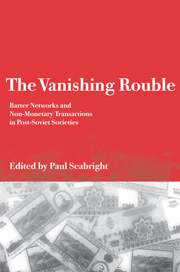Book contents
- Frontmatter
- Contents
- List of figures
- List of tables
- List of boxes
- Preface
- List of contributors
- Introduction: barter networks and ‘information islands’
- I Theory
- 1 Some lasting thing: barter and the value of money
- 2 Barter relationships
- 3 An anthropological view of barter in Russia
- II Large-scale empirical studies
- III Ethnography
- Conclusion: what is to be done?
- Index
3 - An anthropological view of barter in Russia
Published online by Cambridge University Press: 05 May 2010
- Frontmatter
- Contents
- List of figures
- List of tables
- List of boxes
- Preface
- List of contributors
- Introduction: barter networks and ‘information islands’
- I Theory
- 1 Some lasting thing: barter and the value of money
- 2 Barter relationships
- 3 An anthropological view of barter in Russia
- II Large-scale empirical studies
- III Ethnography
- Conclusion: what is to be done?
- Index
Summary
Introduction
If economists have tended to be preoccupied by the problems posed by barter for the efficient allocation of resources, anthropologists are concerned with socio–cultural practices and concepts. The question for them is whether ‘barter’ constitutes anything specific from this point of view, or is merely a collection of diverse activities in different social contexts. There is a definite overlap between the conventional understandings of the two disciplines, however. The received wisdom in anthropology has been that if barter has any specific characteristic, it is that it is ‘purely economic’. Anthropologists have tended to conceive the adjective ‘economic’ in the narrowest terms (individual choices in relation to scarce resources), thus excluding the whole body of the new institutional economics. For a time, this approach meant that for anthropologists barter was not very interesting. ‘Barter’ had very few social implications, being merely a matter of sporadic, one-off swaps between people motivated by economic self-interest. Socially, it was peripheral and ‘negative’ (characterised by haggling and cheating) in comparison to the ‘positive’ features of long-term reciprocity and even altruism attributed to the kinds of exchange embedded in internal kinship and political relations (Sahlins, 1972). This view of barter has recently come under scrutiny, as I describe later. In brief, studies of a range of non-industrial societies have shown that fundamental social relations and important political and cultural values are revealed in activities describable as ‘barter’. But do these observations apply only to small-scale, non-industrial societies? Is barter only ‘social’ when it is archaic?
- Type
- Chapter
- Information
- The Vanishing RoubleBarter Networks and Non-Monetary Transactions in Post-Soviet Societies, pp. 71 - 90Publisher: Cambridge University PressPrint publication year: 2000
- 7
- Cited by



